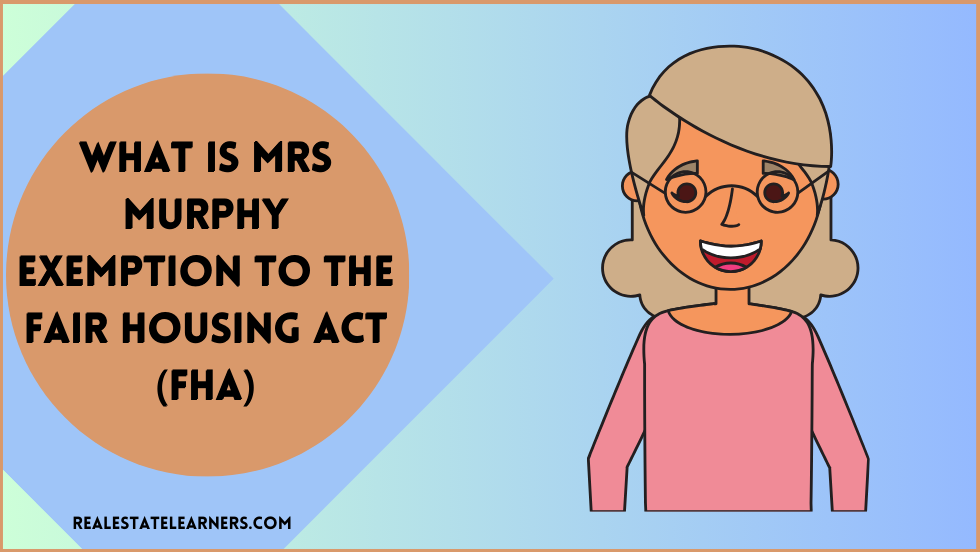Mrs. Murphy Exemption very crucial in the world of real estate. The Mrs. Murphy Exemption is a term that often comes up when talking about fair housing laws and exemptions. It may sound like a person’s name, but it actually refers to a specific provision in the Fair Housing Act. So, let’s dive in and explore what the Mrs. Murphy Exemption is all about.
What is Mrs Murphy Exemption?
The Mrs Murphy exemption is a legal term that refers to an exception in the Fair Housing Act (FHA) which exempts small-scale landlords from certain requirements under the law. This exemption applies to individuals who own and manage no more than four rental units at a time, and who live on the premise with their tenants.
The purpose of this exemption is to provide flexibility for small-scale landlords who may not have the resources or means to comply with all of the requirements set forth by the FHA. However, it is important to note that this exemption does not give landlords the right to discriminate against potential tenants based on their race, color, religion, sex, national origin, disability or familial status.
This exemption also does not apply to properties owned by corporations or organizations, as they are considered separate entities from the individuals who own them.
What is the Fair Housing Act?
Senator Aiken , the original sponsor of the Fair Housing Act, stated that “we have a moral obligation to make sure that every American is afforded equal housing opportunities”. This statement highlights the underlying goal of this law – to promote fair and equal treatment for all individuals in the housing market. He created and imaginary character of Mrs Murphy to give a practical example of the court for better explanation .
The Fair Housing Act is a federal law that prohibits discrimination in the sale, rental and financing of housing based on
- Race,
Color,
Religion,
Gender,
National origin,
disability
or familial status.
It was enacted in 1964 as part of the Civil Rights Act and has since been amended to include additional protected classes such as disability and familial status.
The purpose of this act is to ensure equal housing opportunities for all individuals and families, regardless of their personal characteristics. This means that landlords cannot refuse to rent or sell a property based on discriminatory reasons, including but not limited to the protected classes mentioned above.
How Mrs Murphy Exemption Work in Recent Time?
In recent times, the Mrs Murphy exemption has come under scrutiny and has faced legal challenges. This is due to concerns that some landlords may be taking advantage of this exemption to discriminate against potential tenants.
Some critics argue that the criteria for qualifying for this exemption are too broad, allowing landlords to use it as a loophole to justify discriminatory practices. In response, the Department of Housing and Urban Development has issued guidance to clarify the criteria and ensure that it is not being misused.
However in the modern time some elements of Murphy Exemption still exists and in a more secure way. In general, landlords must still comply with the FHA requirements when it comes to advertising, screening, and selecting tenants.
Landlords falling under Murphy’s Law can still screen tenants on the following basis such as:
- Gender
Religion
Familial status
Disabilities
Who Enforces Fair Housing?
The Department of Housing and Urban Development (HUD) enforces the Fair Housing Act through its Office of Fair Housing and Equal Opportunity. This office investigates complaints of discrimination in housing, conducts fair housing enforcement activities, and provides education and outreach to promote fair housing practices.
In addition to HUD, state and local government agencies also play a role in enforcing the Fair Housing Act.
Many states have their own fair housing laws and agencies that handle complaints of discrimination in housing. These organizations collaborate with HUD to guarantee the protection of individuals’ rights under federal and state laws.
What are the Fair Housing Laws in Different States?
Each state may have its own specific laws and regulations related to fair housing. These laws may provide additional protection against discrimination in certain areas, such as sexual orientation or gender identity.
Some states have broader definitions of protected classes than the federal law, while others may only cover a limited range of protected classes. It is important for landlords and tenants to be aware of the fair housing laws in their state to ensure that they are following all necessary regulations and
avoiding any potential discrimination.
How can Landlord Screen Tenants Without Discrimination?
- Landlords must take careful consideration to avoid any discriminatory practices when screening potential tenants.A clear and consistent screening procedure should be implemented, which does not take into account any of the protected categories outlined in the Fair Housing Act.
Some ways landlords can screen tenants without discrimination include: - Using objective criteria, such as credit scores, income levels, and rental history
Treating all applicants equally and consistently
Avoiding discriminatory language in advertisements or during the screening process
Providing reasonable accommodations for disabled tenants - By following these practices, landlords can ensure they are complying with fair housing laws while still finding suitable tenants for their rental properties.
Conclusion
The Mrs Murphy exemption is an important aspect of the Fair Housing Act that provides flexibility for small-scale landlords while promoting fair treatment for all individuals in the housing market. Landlords must grasp the importance of understanding and adhering to this exemption, as well as other fair housing regulations, to avoid any legal challenges and ensure equal housing opportunities for all.

Corey has over 15 years of experience as a real estate broker and educator. He is dedicated to providing valuable insights and guidance for those looking to enter the real estate industry.

